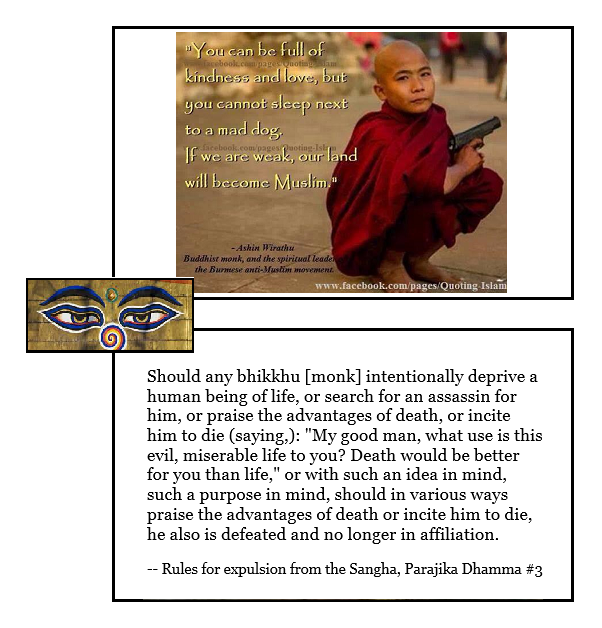[ by Charles Cameron — on monk Wirathu, also the trickiness of images-with-quotes on social media ]
.
The quote from Wirathu (upper panel, above) is a direct quote from a NYT interview with him:
You can be full of kindness and love, but you cannot sleep next to a mad dog,” Ashin Wirathu said, referring to Muslims.
The image was posted on a FaceBook page which is either his or named for him, but appears to have been taken from a National Geographic contest. The photographer’s note reads:
At the annual Ananda Harvest Festival in Bagan, Myanmar, thousands of monks from all over Myanmar came to receive alms. While walking around the vast temple grounds, I chanced upon this boy monk who was playing with his toy gun. Even though it was only a toy gun, I found this image a disturbing juxtaposition of the peace that Buddhism embodies and the violence that guns symbolise.
So the gun is a toy gun, and the monk a boy monk, not Wirathu.
FWIW, I searched for “wirathu hoax” and didn’t find this image listed, but did find a hoax photo attributed to a Wirathu FB page: Fake image being circulated by monk Wirathu to incite anti-Muslim violence in Burma (Warning: Graphic Content).
Figuring out what’s genuine, what’s propaganda. and what’s fake or a hoax is getting harder and harder these days, and we need more and more skeptical spectacles when taking in both texts and images.
The text from the Parajika (lower panel, above) is genuine.
**
Edited to add:
Lion’s Roard, the Buddhist site, had a great piece which intro’d me to the Wirathu quote with image, Facebook using Buddhist tools to fight hate speech in Burma. Extract:
As Burma is emerging from fifty years of military dictatorship, its citizens are thronging to social media, particularly Facebook, and anti-Muslim extremists are too. Facebook is addressing the problem of Buddhist anti-Muslim activists promoting violence on Facebook with a new set of features.
When Facebook users flag content they “don’t like,” a box pops up asking “Why don’t you want to see this?” The user can select options like “it’s annoying” or “it promotes violence.” In Burma, Facebook now also includes the options “it’s a rumor or has false information,” and “it disturbs social harmony.” According to readwrite.com, the second option was chosen specifically for its resonance with Buddhist precepts.
“We wouldn’t normally use this language in the U.S.,” Said Kelly Winters, whose Facebook’s title is “Product Manager for Compassion.” Facebook employs language that resonates with the local market, which, in Burma’s case, is largely Buddhist-influenced.



